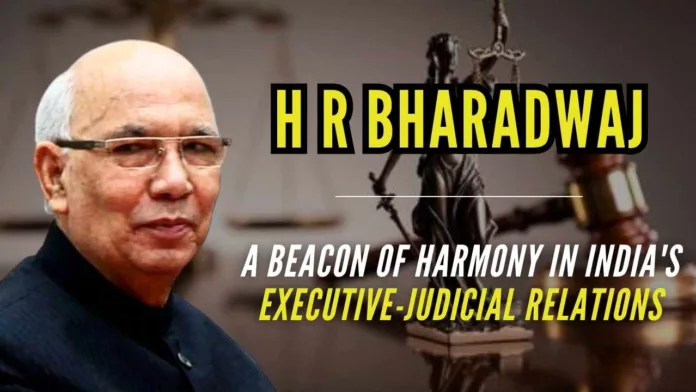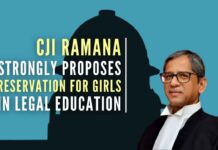
H R Bharadwaj – One individual who played a significant role in managing executive-judicial conflicts
The recent tussle between the executive and judiciary is a matter of extreme concern in India. The relationship between the executive and judiciary in India has been a topic of intense debate and occasional conflict throughout the nation’s history. The balance of power between these two branches of government is crucial for upholding the principles of democracy, maintaining the rule of law, and safeguarding citizens’ rights and liberties. One individual who played a significant role in managing such conflicts was Hansraj Bharadwaj, a former law minister of India.
India’s Constitution establishes a separation of powers between the executive, legislative, and judicial branches. While the executive branch, led by the President and the Prime Minister, is responsible for implementing laws, the judiciary, headed by the Supreme Court, interprets and upholds them. This separation ensures checks and balances, preventing any one branch from becoming too powerful. However, conflicts arise when one branch oversteps its authority or encroaches upon the domain of another.
Executive-judicial conflicts in India have taken various forms, including appointments of judges, the interpretation of constitutional provisions, and clashes over policy decisions. One such notable instance was the controversy surrounding the appointment of judges to the higher judiciary. The process of judicial appointments requires the involvement of both the executive and judiciary. The executive proposes candidates, while the judiciary has the power of final approval. Disagreements and delays in the appointment process have often led to tensions and clashes between the two branches.
Another area of contention has been the interpretation of constitutional provisions. The judiciary has the responsibility to interpret the Constitution, ensuring that laws and government actions are in line with its principles. However, at times, the executive may feel that the judiciary’s interpretation restricts its policy decisions or encroaches upon its authority. Such differences in interpretation have sparked conflicts between the executive and judiciary.
Handling these conflicts effectively is crucial to maintaining the balance of power and upholding the principles of democracy and the rule of law. H R Bharadwaj, who was one of the longest-serving Law Ministers in India, played a significant role in managing these crises during his tenure. Bharadwaj, an experienced lawyer, politician, and compassionate human being had a deep understanding of the legal and constitutional framework of India.
As Law Minister, H R Bharadwaj worked toward establishing effective communication channels between the executive and judiciary. He emphasized the importance of dialogue and consultation to resolve conflicts and promote mutual understanding. Contrary to the present times, Bharadwaj actively engaged with judges and legal experts to address their concerns and find common ground on contentious issues. His efforts aimed to bridge the gap between the executive and judiciary, fostering cooperation and collaboration.
In addition to promoting dialogue, Bharadwaj also advocated for judicial reforms to streamline processes and enhance transparency. He recognized the need for a robust and efficient judiciary to handle the increasing number of cases and reduce the backlog. Bharadwaj supported measures to expedite judicial appointments, ensure fair and impartial selection processes, and enhance the accountability of judges.
Despite Bharadwaj’s efforts, conflicts between the executive and judiciary in India have persisted beyond his tenure. These conflicts continue to raise the important issue of having harmony between the executive and judiciary to deliver impeccable governance to the people. Of course, the comfort of the people must be the first criterion in any democracy. As we remember him on his 85th birth anniversary, the legacy left by H R Bharadwaj is neither maintained nor nurtured by the subsequent UPA and NDA governments.
Note:
1. Text in Blue points to additional data on the topic.
2. The views expressed here are those of the author and do not necessarily represent or reflect the views of PGurus.
PGurus is now on Telegram. Click here to join our channel and stay updated with all the latest news and views
For all the latest updates, download PGurus App.
- H R Bharadwaj: A beacon of harmony in India’s executive-judicial relations - May 18, 2023
- Shree Dwarkeshlalji in the quest for global peace - June 28, 2022
- Opinion Express celebrates 30 years of success - November 25, 2021








